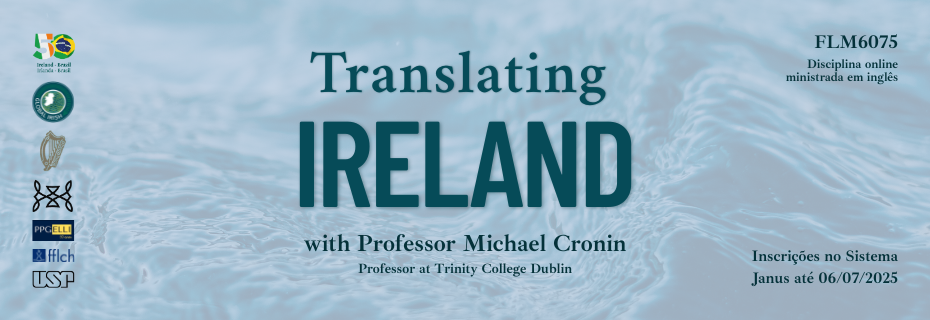
Objectives:
- Historicize the value of translation in the linguistic, cultural, social and political development of Ireland.
- Raise the students’ awareness of the critical role of translation in the transformation of national cultures.
Rationale:
Translation has been a crucial element in the linguistic, cultural, social and political development of Ireland over the centuries. This factor in Ireland’s development and international influence has often been neglected as translation has often been ignored or written out of conventional histories of the country. The proposed course beginning in the medieval period will take students up to the present day and will chart the influence of inward translation on changes in the linguistic, cultural and poliutical makeup of the island and will examine the impact of outward translation in giving Ireland a cultural presence on the global stage. The aim of the course is to raise students’ awareness of the critical role of translation in the transformation of national cultures.
Content:
Topic 1: Rome and Greece in Medieval Ireland
Topic 2: Revolutionary translation in 19th centrury Ireland
Topic 3: Translation in James Joyce’s The Dead
Topic 4: Translation for the New Nation: translation and language revival
Topic 5: Translation and Soft Power: Irish Cultural Dpilomacy in the Modern Age
Topic 6: Seminars & Conclusion
Type of Assessment:
- Interaction in the discussions and seminars motivated by the reading of theoretical, literary, artistic and cultural texts: 30%
- Final research paper: (70%).
Evaluation:
I – A – Excellent with credits;
II – B – Good with credits;
III – C – Regular with credits;
IV – R – Failed without credits;
V – T = Approved in a subject taken outside USP.
Bibliography:
Coilféir, Máirtín (ed.) An Scéim: An Gúm 1926–2016 (Dublin: An Gúm, 2020).
Cronin, Michael, Translating Ireland: Translation, Language, Cultures (Cork: Cork University Press, 1996).
Cronin, Michael, Translation and Identity (London: Routledge, 2006).
Gaffney, Phyllis, Foreign Tongues: Victorian Language Learning and the Shaping of Modern Ireland (Dublin: University College Dublin Press, 2024)
Mooney, Sinéad, A Tongue Not Mine: Beckett and Translation (Oxford: Oxford University Press, 2011).
O’Connor, Anne, Translation and Language in Nineteenth-Century Ireland: A European Perspective (Palgrave, 2017).
Uí Laighléis, Gearóidín, Gallán an Ghúim: Caidreamh an Stáit le Scríbhneoirí na Gaeilge: Máirtín Ó Cadhain, Seosamh Mac Grianna agus Seán Tóibín (Dublin: Coiscéim 2017).
Wawrzycka, Jolanta and Mihálycsa, Erika (eds), Retranslating Joyce for the 21st Century (Leiden: Brill, 2020).
Languages taught: English
Class type: Online Não-Presencial
Additional class type information:
I. Descrição do tipo de material e/ou conteúdo que será disponibilizado para o aluno. Material bibliográfico: artigos, capítulos e livro em PDF, Slides (PowerPoint). II. A plataforma para comunicação remota que será utilizada. Google Meet e Moodle Stoa (USP). III. A forma de controle da frequência nas aulas. Informação sobre a obrigatoriedade ou não de disponibilidade de câmera e áudio (microfone) por parte dos alunos. Frequência via formulário do Google e presença sincrônica. Uso de câmera aberta e áudio são obrigatórios para sua participação nas aulas. IV. A forma de avaliação da aprendizagem (presencial/remota). A forma de avaliação ocorrerá mediante a participação dos discentes nas aulas remotas, seminários e por meio da entrega de um artigo ao final da disciplina. V. Os critérios de avaliação contemplando qual a(s) metodologia(s) utilizada(s) e como ser(á)ão atribuído(s) o(s) conceito(s). - Participação em debates e seminários gerados por textos críticos, literários e artísticos designados (30%); - Trabalho final: artigo de pesquisa (70%). - Avaliação: I – A – Excelente, com direito a crédito; II – B – Bom, com direito a crédito; III – C – Regular, com direito a crédito; IV – R – Reprovado, sem direito a crédito; V – T = Aprovado em disciplina cursada fora da USP.
Inscrições: Janus
- https://uspdigital.usp.br/janus/componente/disciplinasOferecidasInicial.jsf?action=3&sgldis=FLM6075&idioma=en
- https://uspdigital.usp.br/janus/componente/disciplinasOferecidasInicial.jsf?action=4&sgldis=FLM6075&ofe=1&idioma=en
Inscrições como aluno especial: flm@usp.br
Interessados em se inscrever como ouvintes devem enviar um email à Cátedra W. B. Yeats: catedrawbyeats@gmail.com

